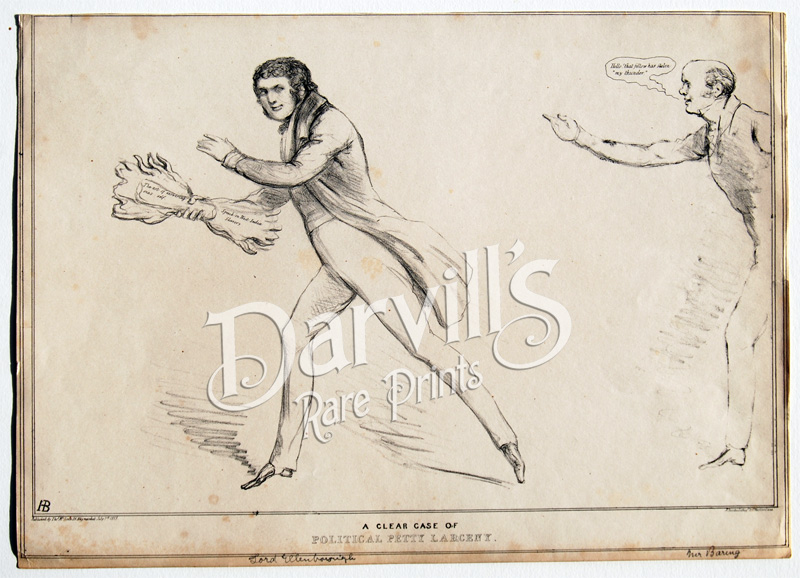
Title:
A CLEAR CASE OF POLITICAL PETTY LARCENY
Materials:
paper
Techniques:
lithograph
Production person:
Print made by John Doyle (HB)
Published by: Thomas McLean
Production place:
London, England
Date: JULY 1, 1833
Schools/Styles:
British satire
[British Museum Satires no number]
Description
No. 271. A man in centre (Lord Ellenborough), holding papers in his right hand lettered with 'The art of answering one's self.' and 'Speech on West India Slavery', walking fast towards left, with his head turned to front, looking back at a man following from behind, with his right arm outstretched (Alexander Baring).
Curator's comments
Text from 'An Illustrative Key to the Political Sketches of H.B.', London 1841:
It is an unfortunate condition of mind that is at once so eager and so short-sighted as to pursue a course of argument, with the utmost ardour, without being able to see where it may lead; and it frequently happens, to those whose minds are of this order, that they make the latter part of their speeches an answer to the former. Such a speaker resembles the miraculous runner in the American story, who ran round a ring with such swiftness that at length he fairly ran over himself. H.B., in this sketch, insinuates that Lord Ellenborough has achieved the marvel of answering himself, in his speech on "West India slavery; and, further, that in so doing he has encroached on the privilege of Mr. Baring, (the present Lord Ashburton,) who previously had enjoyed the distinction without a rival. Mr. Baring's expression, "that fellow has stolen my thunder," is, perhaps, sufficiently understood without elucidation; yet there may be some to whom the story of Dennis and his thunder is new, and those who remember how admirably it was related by Canning in the House of Commons, and how effectively it told against his political adversaries, will not think it unworthy of repetition. When Mr. Canning was bringing forward certain measures of commercial reform, the members of opposition, and Mr. Brougham in particular, while they gave their assent to his proposed plans, denied him any other description of merit than that of having adopted plans which they had been recommending to his predecessors for years past without gaining attention. "Had we been in power," said they, "we should have done these things long ago." Canning submitted to this in silence on two or three successive occasions; but when it had been repeated just often enough to give him a good opportunity of retaliating he took notice of it, and told the story of Dennis the critic, the same Dennis whom Pope so often lashes, and who had formed a most exaggerated estimate of his own importance. In his tragedy of 'Appius and Virginia', he introduced a new method of imitating thunder. The tragedy was soon set aside, but the imitation of thunder was permanently adopted. One night he was at the theatre when Macbeth was played. The piece opened, as usual, with loud peals of thunder; and the theatrical Joves, being in a humour to gratify the house, made each successive peal more startling than the former, at which the audience in the gallery was so delighted that they repaid the obligations with plaudits equally long and loud. It was literally clap for clap. This awakened the self-admiration of poor Dennis, who heard the applause with infinite delight and gratification; and, when it had subsided, rose from his seat in the pit, and addressing the house with a due mixture of modesty and pride, thanked them for their kind expressions of approval; but added, as he pointed to the stage, "You see how those fellows use me; they won't play my Play, and yet they steal my thunder."
John Doyle 'HB' caricatures home page (hand-coloured) or John Doyle 'HB' caricatures (un-coloured)